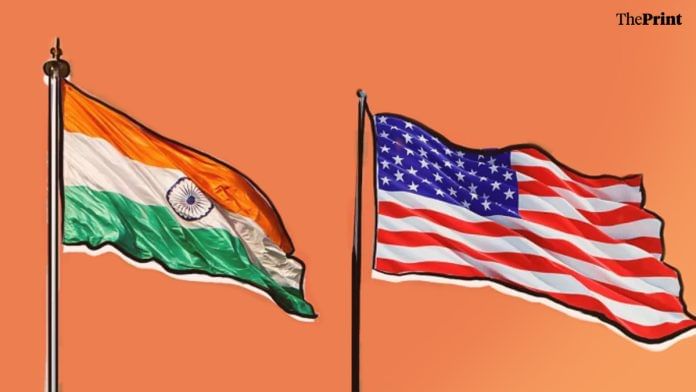
New Delhi: Nineteen Indian companies sanctioned by the US Wednesday for their alleged role in supporting the Russian ‘war machine’ did not “violate” Indian laws with their transactions, the Ministry of External Affairs (MEA) made clear Saturday. It added that India is in touch with American authorities to clarify issues regarding export controls.
“Our understanding is that the sanctioned transactions and companies are not in violation of Indian laws. Nevertheless in keeping with India’s established non-proliferation credentials, we are working with all the relevant Indian departments and agencies to sensitise Indian companies on applicable export control provisions as well as inform them on new measures being implemented that could impact Indian companies in certain circumstances,” MEA spokesperson Randhir Jaiswal said at a press briefing Saturday.
Jaiswal pointed to India’s membership in three “key multilateral non-proliferation export control regimes,” namely the Wassenaar Arrangement, the Australia Group and the Missile Technology Control Regime, to burnish New Delhi’s global credentials on non-proliferation.
“India has a robust legal and regulatory framework on strategic trade and non-proliferation controls and has been effectively implementing relevant United Nations Security Council sanctions and UNSC resolution 1540 on non-proliferation,” he said.
On 30 October, the US sanctioned nearly 400 individuals and entities across at least 17 countries, including India, the People’s Republic of China, Switzerland and Türkiye in an effort to “stop the flow of critical tools and technologies” that Russia needs to continue its war with Ukraine.
Of the nearly 400 new sanctions, the US treasury department sanctioned 275 individuals and entities, the State Department imposed sanctions on more than 120 individuals and entities, and the Department of Commerce added 40 entities to its Entity List.
“As evidenced by today’s action, we are unyielding in our resolve to diminish and degrade Russia’s ability to equip its war machine and stop those seeking to aid their efforts through circumvention or evasion of our sanctions and export controls,” said Wally Adeyemo, the Deputy Secretary of the Treasury Wednesday.
Indigenous arms maker on US sanctions list
One of the firms sanctioned by the US treasury department, Lokesh Machines Ltd, is a small arms manufacturer. It manufactures the indigenous submachine gun called Asmi, designed by an Indian Army officer.
Earlier this year, the firm delivered 550 9x19mm calibre submachine guns to the Indian Army’s Northern Command. Besides the Army, several state police forces along with the National Security Guard (NSG), Assam Rifles and the Border Security Forces (BSF) have evinced interest in Asmi.
Founded in Hyderabad in 1983, Lokesh Machines Ltd has come under the scanner of the US treasury department for what the US terms are “dozens” of its shipments of machine tools to Russia and aiding Moscow’s manufacturing sector.
“India-based advanced machine tool manufacturer and supplier Lokesh Machines Limited (Lokesh) openly advertises its exports to Russia and attended major Russian metalworking exhibitions to showcase its products in 2024,” said the US treasury department.
It added: “Since 2023, Lokesh has sent dozens of shipments of machine tools to various Russian manufacturing companies. Lokesh employees have been coordinating with US-designated Russian defence procurement agent Dmitrii Vladimirovich Alikhanov (Alikhanov) and his US-designated, Russia-based company Newton-ITM to import Italy-origin CNC machines from US-designated Fagima SPA.”
While ties between India and the US, especially in the defence and security sectors, have grown in recent years, there are a number of challenges and the new sanctions will add to that list. A major challenge for the two governments has been the foiled murder-for-hire plot against the Sikh separatist Gurpatwant Singh Pannun–an Indian designated terrorist.
The plot, which was foiled last June, saw the US Justice Department charge one Indian national–Nikhil Gupta–while placing a former Indian intelligence officer Vikash Yadav on FBI’s most wanted list. New Delhi set up a high-level inquiry committee to look into evidence shared by the US in November 2023. Yadav has since been dismissed by the government but faces a number of cases including attempted murder and kidnapping.
source : theprint
